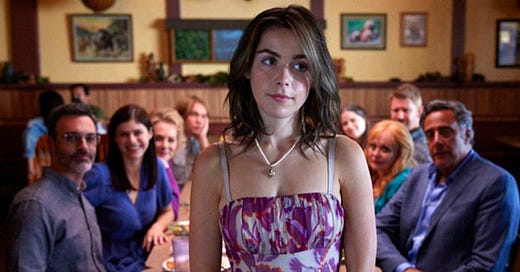It Is Fine, Everything Is Fine
"Wildflower" uses sentimentality and sweetness to reach an understanding of independence.
Dear Moviegoers,
I suspect that, at some point in the writing process, Matt Smukler’s drama Wildflower was titled something else. Suspect, of course. Wildflower suggests, to me, a movie about a lovely but free-spirited individual. Wildflower, as it plays, is more the story of a family that’s centered around a spunky but responsible teenager’s perspective. The poster certainly makes this clear, with the main character Bea (Kiernan Shipka) front and center, surrounded by the extended cast of people in her life. Maybe the title is a pixie-stick indie flick sales trick?
Who knows. The film is a narrative told partially from the inner monologue of Bea, who is in a coma but is still very much aware of things. Bea tells her tale in flashback, starting from birth to the present, going from her Mother and Father meeting to the accident that sent her to the hospital. Fairly straightforward and standard in setup, but certainly with that indie flick shakeup: Her parents have intellectual disabilities, and her entire family is at their wits ends about how to care for the three of them. Maybe the premise is a tear-jerking illusion?
No. Wildflower uses its potential sappiness and corny expectations as devices for performing a 180-degree flip from the first 10 minutes. This movie is not a pity party for Bea or for the family that argues over how to handle two disabled loved ones. This movie is a celebration of independence and living the best lives possible, no matter the obstacles, and no matter how corny that notion by itself might be.
Samantha Hyde and Dash Mihok play Bea’s parents - two confident and sure-footed people who, despite some struggle, get along in life happily. Bea, short for Bambi (named after her Mom’s favorite cartoon), spends her days between school and work trying to take care of household duties, playing a type of caregiver on top of being a teenager on the cusp of college. She’s particularly smart and could get into any university she’d want, but chooses to hold back out of a self-appointed obligation to her parents. But, of course, there’s nothing “wrong” with either of them. In fact, more than the extended family, they’re the only ones truly enjoying each and every day. They’re part of the community, they work, they drive, and they love each other. What’s the problem?
I was absolutely surprised at how sensitive this movie got with regards to the subject of and advocacy for independent living for people with disabilities, and how truly fulfilling it is. According to the limited background that I’ve done on the film, Writer & Director Matt Smukler based some of this story on his own life and experiences. I’d love to ask him some questions about Wildflower someday, but for now, I’m just happy that such a movie with such a wonderfully positive message about being independent and letting others become self-reliant exists.
Sometimes, Wildflower does get a little too sappy and sweet, and sometimes it does venture a tad bit into young adult novel territory, but it never gives in to these cracks and faults. Kiernan Shipka’s charm and sheer presence guarantee this. She plays mature spunk extremely well and has the kind of romantic forward-looking eyes that make a girl named Bambi a delightful reality. She plays Bea as not quite beyond her years but definitely with a stuck-in-the-moment attitude. She’s optimistic but with caution. She’s great here.
I’m glad that Wildflower hasn’t been marketed as a movie with a social messenger, as this would spoil audiences and sour them on the film as a whole. I’m also upset that there hasn’t been much if any marketing for it at all. If there’s not enough money in the budget for promotions, why bother with giving it a manic-pixie-dream-indie title? It just feels tacked on to an otherwise non-tacky movie. Whatever helps?
Ok. 3.5/5
Wildflower is now streaming on Hulu and is available for rent or purchase.







